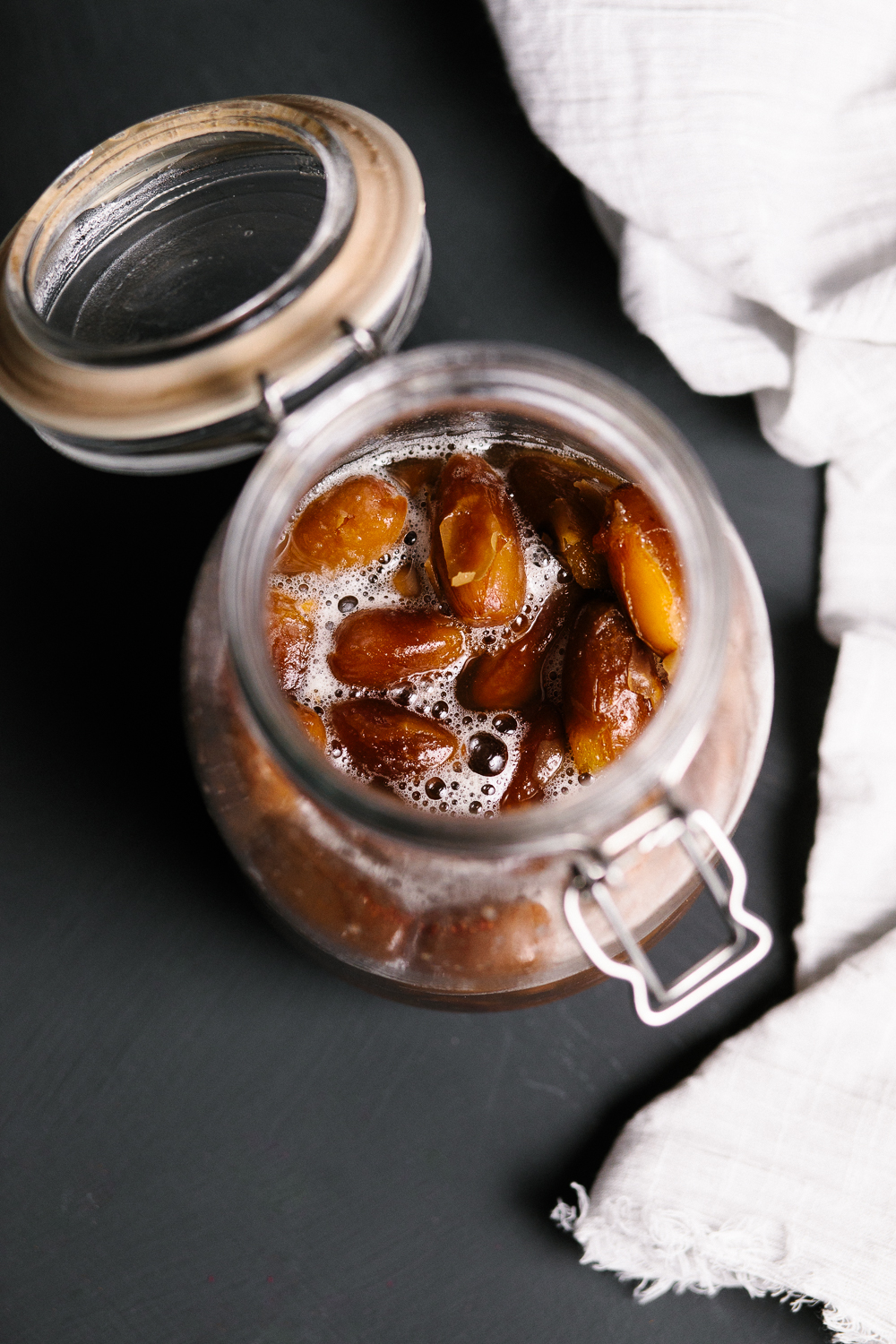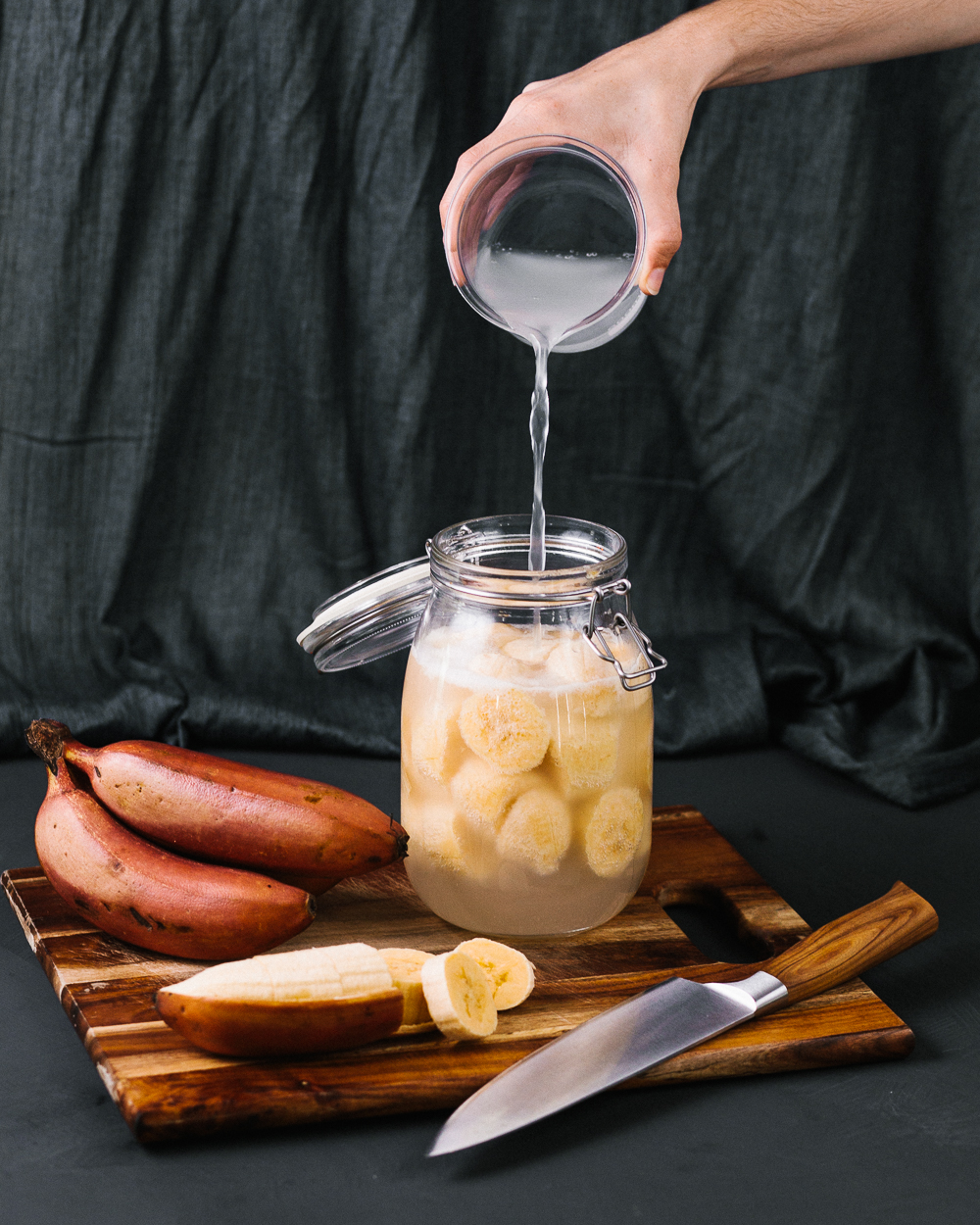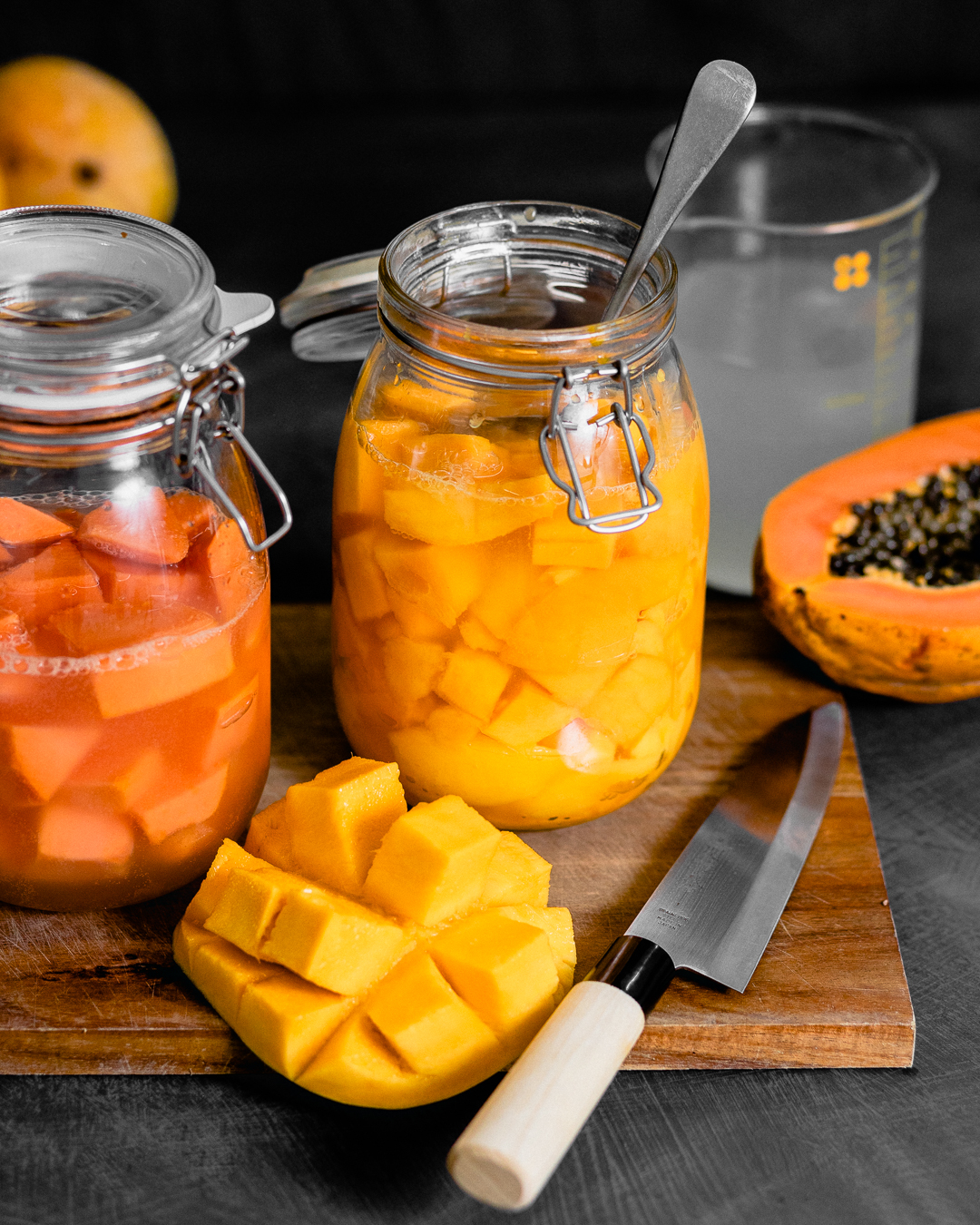Fruit is full of nutrients, minerals, antioxidants, fibre and raw enzymes that our bodies absolutely thrive off. Unfortunately, fruit is also high in sugar. When you have gut issues, your digestive system has a hard time breaking these sugars down. Some people with gut issues even have the inability to metabolise fructose sugar which is called 'fructose malabsorption'. This means that the sugars are left to ferment inside the gut, creating a food source for bad bacteria, parasites and yeasts to thrive on. If we keep eating these sugars and not metabolising them properly, then bad bacteria can get out of hand and begin to rapidly overgrow. This can lead to a range of physical and psychological symptoms like; sugar cravings, mood issues like anxiety or depression, digestive issues like gas, cramps, bloating, diarrhoea or constipation, lethargy, skin problems etc.
Why You Should Ferment Your Fruit
If you start fermenting fruits with either coconut kefir or coconut yoghurt, the probiotics contained in them will remove these potentially problematic sugars making them FODMAP friendly. At the same time, whenever you ferment something, you basically turn it into a superfood because fermentation;
· Pre-digests it
· Helps to create beneficial enzymes
· Creates B Vitamins
· Rich in probiotics
· Increases immunity
· Improves bowel health
· Makes other food easier to digest
· Bio-availability of minerals increases + preserves the nutrients and minerals
· Creates Vitamin K2
· Anti-carcinogenic
· Aids digestion
· Help to regulate appetite
· Reduce sugar cravings
· Increases antibodies
· Increases Vitamins A and C
· Helps to remove toxins from the body
· The process of fermenting removes sugar from fruit/veg
· Helps to restore a healthy flora in the intestine
How Do You Ferment Fruit?
There are 2 different ways you can ferment fruit;
Chop the fruit up and cover it in coconut water Kefir or
Blend the fruit up with coconut yoghurt
I have a few recipes that you can follow to get started
FAQS
I CAN'T CONSUME ANY SUGAR BECAUSE I'M ON A KETOGENIC/ LOW CARB DIET, SO HOW WILL I KNOW WHEN THE FRUIT IS READY AND ALL THE SUGAR HAS BEEN EATEN UP BY THE PROBIOTICS?
High Sugar Fruits
I would recommend for the higher sugar fruits such as pineapple, bananas and dates that you allow them to ferment for 48 hours. Taste them after 48 hours, if it still has some sweetness to it, it may need a few extra hours to ferment. However if all the sweetness has gone, they're ready, so just place them in the fridge to stop the fermentation process.
Medium Sugar Fruits
Fruits such as oranges, apples and figs may only need 24 hours to ferment. So taste them after 24 hours to see if they're ready.
Low Sugar Fruits
For low sugar fruits like berries, they may only need 6-12 hours to ferment. As always, taste, taste, taste to see if they're ready.
HOW LONG WILL THE FERMENTED FRUIT LAST FOR?
The fruits can continue to slowly ferment in the fridge, so it's best to consume the fruit within a week as it can taste a little alcoholic if left to ferment for too long, or just freeze it to use it for probiotic ice-cream.
I ACCIDENTALLY OVER-FERMENTED MY FRUIT, WHAT SHOULD I DO?
I would recommend you blend it up into things such as a smoothie, smoothie bowl, probiotic ice-cream or blend it into coconut yoghurt. I usually like to pair the over-fermented fruit with strong flavours such as vanilla, cinnamon, mango, banana etc as they help to overpower the alcohol taste. I will also add in extra stevia and lemon or lime juice to help balance out the flavours. I hate waste and especially hate throwing out fermented fruits teaming with billions of beneficial bacteria so I'll always find a way to re-purpose it and make it taste better. It's a bit of an experiment, but have fun playing around with it. HOWEVER, it's also important to be aware that if you have liver issues, it may not be best for you to consume over-fermented fruit because it could overburden your liver trying to deal with the unwanted (small amount of) alcohol.
I HAVE GUT ISSUES, SHOULD I ONLY EAT FERMENTED FRUIT?
In my opinion, I think you should make an effort to consume fermented fruits sooner rather than later. I would also recommend you seek support from a health practitioner like myself or your chosen health care practitioner for individualised gut health advice if you need more guidance.
WHY DO YOU USE A STARTER CULTURE?
I use either the coconut yoghurt or coconut water kefir starter cultures as they ensure ONLY the beneficial bacteria grow in whatever you're fermenting. If you do a wild ferment, you rely on whatever bacteria or yeasts are in your environment or on the fruit/ veggies itself to ferment it. This can be risky as you have no idea what bacteria are there, so unfortunately it could be a bad bacteria or yeast strain which could lead to some yucky and uncomfortable health symptoms (bloating, gas, headaches, rashes, diarrhoea, brain fog etc). See below for why I don’t recommend using Kombucha to ferment your fruit.
KOMBUCHA VS CULTURED KEFIR... WHAT’S THE DIFFERENCE?
This is such a common question! Ferments like kefir grains and kombucha are known as "wild ferments". These types of ferments often include unknown bacteria strains that may be harmful to the gut and digestion. The potency is often very low, and generally high in yeast. Wild fermented kefir naturally contains histamines and tyramine; both are associated with migraines and linked with mental health complications. Sugar is also typically added post-ferment for kombucha. The reason I recommend the starter cultures from Kultured Wellness is because they are made with specific probiotics. They offer a therapeutic-grade probiotic potency, 27 Billion CFU (Colony Forming Unit)/cup for coconut kefir and 41 Billion CFU/cup for coconut yoghurt. The pure probiotic bacteria strains made as a “controlled ferment” make them ideal for people who have trouble with gut issues.
MY FERMENTED FRUIT IS STILL SWEET AFTER 2 DAYS, HAVE I DONE SOMETHING WRONG?
No not at all, sometimes it can take a little longer to ferment if the weather is cooler or if it's winter. So you can wrap it up in a towel or jumper and leave it for a few hours or another day and keep tasting it to see when it's ready.
WHAT DO I DO WITH THE LEFTOVER LIQUID FROM THE FERMENTED FRUIT?
You can drink it. Re-use it to ferment a different batch of fruit. Add it to smoothies. Freeze it into ice-blocks.
IF I'VE NEVER HAD FERMENTED FRUIT BEFORE, HOW MUCH SHOULD I START WITH?
I recommend adults start with 1/4 cup and children 1 Tbsp and slowly build up your tolerance to the high amount of probiotics you get with each cup/ bowl of fermented fruit.
I'M ON A PALEO, VEGAN, GLUTEN-FREE, DAIRY-FREE, CASEIN-FREE, ANTI-INFLAMMATORY, LOW FODMAP, GAPS DIET. CAN I EAT FERMENTED FRUITS?
Yes, absolutely. If you use the coconut yoghurt to ferment your fruits, it's D‐Lactate free which is highly beneficial for those people with issues such as MTHFR, liver & detox problems, allergies, eczema and psoriasis issues because it helps to establish the gut wall and protect against leaky gut. It can also assist in rebuilding after antibiotic use and diarrhoea, combatting candida and crowding out viruses, reducing inflammation and more. The beneficial bacteria eats away all the sugars, so it's perfect for those with FODMAP issues.
CAN I GIVE THEM TO MY BABY?
Absolutely. When you start introducing solids, you can start incorporating the Kultured Wellness coconut yoghurt and kefir, and fermented foods (like fruit) with their nutrition. Starting at very small amounts. Just like adults, it needs to be a build up from a very small amount as these are a therapeutic probiotic food. For bub, 1/8 - 1/4 tsp of yoghurt to start and build up from there. The addition of kefir diluted in water or frozen into a little ice block when it’s hot is a great way to start introduction of kefir into their nutrition as well, or a small piece of fermented banana (or other fruit).
If you have any other questions, please feel free to comment below. I'd love to hear them :)
Jordan x





